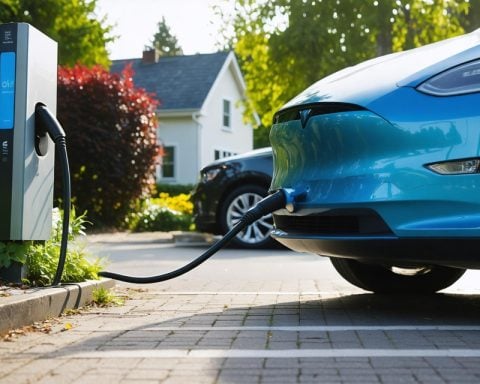The Future of Electric Vehicles is Here
A transformative collaboration between Stellantis and Zeta Energy is on track to change the electric vehicle (EV) landscape significantly. This partnership, combining Stellantis’s expertise in automotive manufacturing with Zeta Energy’s cutting-edge lithium-sulfur battery technology, promises to increase EV charging speeds by an astounding 50% and greatly reduce battery production costs.
The innovative lithium-sulfur batteries, primarily composed of sulfur, are forecasted to outperform conventional lithium-ion batteries on multiple fronts, including weight and energy density. This means that these new battery packs are not only lighter but also deliver comparable energy efficiency.
Enhanced charging capabilities will pave the way for more affordable electric vehicles, making them more accessible to consumers. Furthermore, the eco-conscious production methods employed in crafting these batteries will leverage waste materials and methane, thus significantly lowering carbon emissions compared to traditional manufacturing processes.
As concerns regarding climate change escalate, advancements from Stellantis and Zeta Energy are poised to contribute to a cleaner and more sustainable transportation future. These developments will not only facilitate a surge in EV adoption but may also shift urban mobility trends, encouraging more environmentally friendly transport alternatives.
In summary, the joint efforts of Stellantis and Zeta Energy represent a critical leap forward in battery innovation, promising to reshape the EV market while prioritizing sustainability. Keep an eye out for these exciting changes that could redefine electric mobility forever.
Implications of Advancements in Electric Vehicle Technology
The collaboration between Stellantis and Zeta Energy signifies more than just an advance in battery technology; it potentially reshapes the societal landscape, influencing everything from urban planning to global economic structures. As electric vehicles (EVs) become increasingly accessible, we will likely see a shift in consumer behavior that prioritizes sustainability. This transition may foster a culture that embraces green technologies, ultimately leading to greater demand for eco-friendly products across industries.
The implications for the global economy are profound. Billions of dollars are poised to flow into research and development as companies vie for competitive advantages in the EV market, contributing to job creation and innovation. Notably, this could result in the emergence of new sectors focused on sustainable energy solutions—areas that, just a decade ago, were considered niche markets.
From an environmental perspective, the rise of lithium-sulfur battery technology, which leverages sustainable materials, could reduce resource extraction impacts associated with traditional lithium mining. As the automotive industry moves toward a circular economy model that emphasizes the recycling of materials, the ecological footprint of vehicle production may significantly lessen.
In the long term, we might envision smarter cities where EVs facilitate a move away from gas-powered transportation. This evolution could promote cleaner air quality, reduce traffic congestion, and create a robust network of sustainable transport options. Thus, the partnership between Stellantis and Zeta Energy not only carries the promise of technological innovation but harbors the potential to herald a new era of conscientious urban mobility.
Revolutionizing Electric Vehicles: The New Era of Lithium-Sulfur Batteries
The Future of Electric Vehicles is Here
The electric vehicle (EV) industry is on the brink of a significant transformation, thanks to a groundbreaking partnership between Stellantis and Zeta Energy. With a focus on innovation and sustainability, this collaboration brings forth advanced lithium-sulfur battery technology that is set to revolutionize the EV landscape.
Key Innovations in Battery Technology
The lithium-sulfur batteries developed by Zeta Energy are designed to exceed the performance of traditional lithium-ion batteries in multiple aspects, including:
– Enhanced Energy Density: Lithium-sulfur batteries have a higher energy density, enabling vehicles to travel longer distances on a single charge.
– Weight Reduction: These batteries are lighter than their lithium-ion counterparts, potentially improving vehicle efficiency and handling.
– Cost Efficiency: The production costs of lithium-sulfur batteries are significantly lower, which could lead to decreased prices for electric vehicles.
Charging Speed Improvements
One of the standout features of these new batteries is their ability to charge 50% faster than existing technologies. This improvement in charging infrastructure is crucial for addressing one of the major barriers to EV adoption: long charging times. With quicker charging options, consumers are likely to find electric vehicles more convenient for daily use.
Environmental Sustainability
In an era of increasing environmental concern, Stellantis and Zeta Energy are placing a strong emphasis on sustainable manufacturing practices. By utilizing waste materials and capturing methane during production, these batteries promise to deliver not only performance but also a reduced carbon footprint.
This commitment to sustainability aligns with global efforts to combat climate change and shows how advancements in battery technology can lead to more eco-friendly transportation solutions.
Impact on Urban Mobility Trends
As electric vehicles become more affordable and accessible, we can expect to see a shift in urban mobility trends. The integration of faster-charging EVs into public transport systems could enhance public transit efficiency, making electric buses and shared vehicles more viable options.
Pros and Cons of Lithium-Sulfur Batteries
Pros:
– Higher energy density leading to longer driving ranges.
– Reduced weight, enhancing vehicle performance.
– Lower production costs which may pass savings to consumers.
– Environmentally friendly production processes.
Cons:
– As a relatively new technology, long-term durability and lifespan compared to established lithium-ion batteries still require evaluation.
– Market acceptance and infrastructure support are needed to fully integrate these new batteries into the EV ecosystem.
Market Insights and Predictions
Analysts predict that the advancements made by Stellantis and Zeta Energy will significantly boost the adoption rate of electric vehicles. As consumer options expand and prices decrease, more individuals are likely to transition to electric mobility.
Furthermore, the automotive industry may witness increased competition as more companies explore similar partnerships to advance battery technology and meet consumer demands for performance and sustainability.
Conclusion
The collaboration between Stellantis and Zeta Energy marks a pivotal moment in the evolution of electric vehicles. By enhancing battery technology and production methods, this partnership is set to drive a sustainable future in transportation. As developments unfold, we can anticipate a remarkable impact on both the EV market and environmental goals link name.
Stay tuned for more updates on this exciting journey toward redefining electric mobility.













